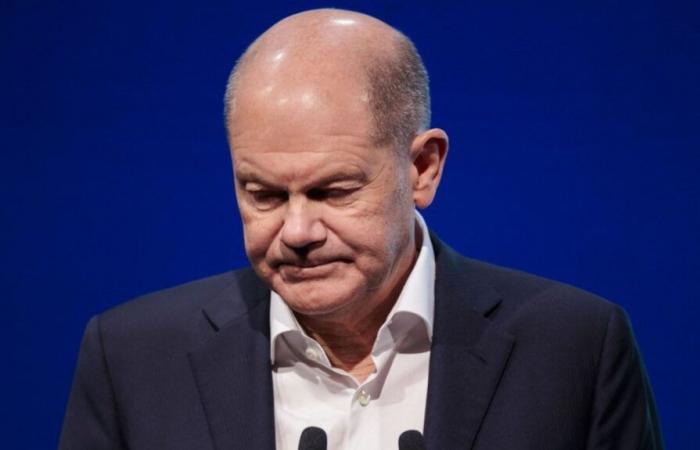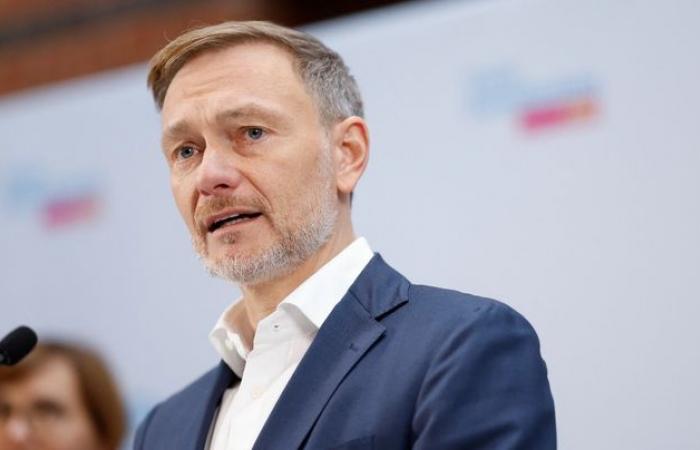The German leader dismissed his Finance Minister, leader of the liberal party, on Wednesday. He now intends to submit a question of confidence to deputies in mid-January, with a view to legislative elections in March, six months before the scheduled date.
The government coalition in power in Germany fizzled out. The dismissal of Christian Lindner, Minister of Finance, marked the end, Wednesday, November 6, of this fragile alliance between the social democrats of the SPD, their environmentalist allies, on the left, and the liberals of the FDP, on the right. “Too often he betrayed my trust”justified the German Chancellor, Olaf Scholz. In the process, the Liberal Democratic Party announced that all its ministers would leave the government, thus depriving the chancellor of his majority in the Chamber of Deputies.
Olaf Scholz will therefore submit a question of confidence to German deputies in mid-January, with a view to legislative elections in March – six months before the normally scheduled date. But this timing asks: is there a link with Donald Trump's victory in the United States? “A bad combination of circumstances”smiles Paul Maurice, secretary general of the Study Committee on Franco-German Relations (Cerfa) at Ifri. “There had already been negotiations between the members of the coalition last week, we expected it to fall on Wednesday.” In recent months, the gap has continued to widen between the left and right wings of the alliance initiated almost three years ago, at the end of November 2021. Budgetary differences, internal quarrels, opposition from the liberal electorate. .. Here are the sparks that lit the fuse.
The budgetary differences were too deep
Tensions crystallized around the budgetary direction to take. In full preparation of the 2025 budget, the left wing of the alliance wanted to open the floodgates to revive the national economy, when the liberals were pleading for social cuts and strict budgetary discipline. “The main problem was the debt brake, advocated by the Minister of Finance”and which imposes a maximum budget deficit of 0.35% on the German economy, explains Paul Maurice. “It blocked the Greens from the energy transition and, for all partners, investments in defense and security”a question that has become central since the Russian invasion of Ukraine.

The clash of budgetary cultures is all the more marked as the German economy is suffering. The country has not been spared from inflation and its growth for 2024 is expected to be zero. The implementation of certain measures carried out by the left wing therefore failed to see the light of day or had a limited scope, according to Paul Maurice: “The economic situation worsened by the war in Ukraine did not make it possible to accelerate the energy transition by doing without coal because the increase in the price of gas made this impossible. Same thing for the increase in the hourly minimum wage in 2022, which “was not very felt in the face of galloping inflation”he adds.
What finally ignited the powder was an 18-page document, which leaked to the German press on Saturday. Christian Lindner sets out a series of measures, including the end of the solidarity tax and the abandonment of climate objectives. The text falls under the “neoliberal rhetoric” et “is not compatible with the coalition contract”reacted SPD MP Nils Schmid to the Daily Mirror. To overcome these increasingly serious disagreements, Olaf Scholz organized new talks on Wednesday, which turned out to be the last.
The coalition was undermined by dissension
“Selfish”, “irresponsible”… Olaf Scholz did not mince his words when he spoke to the press after dismissing Christian Lindner. A member of the government “must be ready to make compromises in the interest of all citizens. But that is not what interests Christian Lindner at the moment”, hammered the German chancellor, proof of the execrable relationship he had with his minister.
“Christian Lindner cares about his own constituency. He is worried about the short-term survival of his own party.”
Olaf Scholz, German chancellorduring a press conference
The leader of the FDP was not kind to those who were his allies. Christian Lindner, for example, described Olaf Scholz's economic proposals as “dull” and criticized the ecologist Minister of the Economy for his “conceptual impotence”. “He has behaved from the start like an opposition leader within the government to which he belongs”estimated at the end of October Markus Linden, political scientist at the University of Trier, with L’Express.
Christian Lindner thanked, “the other FDP ministers explained that they were going to submit their resignation to the chancellor”declared the president of the movement's parliamentary group, Christian Dürr. “Relations between the liberals and other members of the alliance have been complicated by their different visions, pointe Paul Maurice. Culturally, the Liberal Party has moved further to the right than it was around thirty years ago.” The specialist nevertheless qualifies: “There are certain liberal ministers with whom it was easier. The Minister of Transport did not resign from the government but from the FDP, for example.”
Liberal voters view this alliance unfavorably
The base of the Liberal Democratic Party has been increasingly harsh towards its elected officials. At the start of the year, members asked for a vote to be held on whether or not the party should remain in the coalition. The “yes” vote narrowly won, with 52.2% of the vote, recalls The World. But, a few months later, in an opinion survey relayed at the end of September by the Daily Mirror63% of FDP voters did not say they were against a departure of their deputies from the Bundestag – the equivalent of Parliament in France.
“Liberal voters criticize them for having participated in this government and having made compromises,” deciphers Paul Maurice. An argument also put forward by Christian Lindner. “Our voters tell us that we are focusing too much on ecology and social issues. The program and values of the FDP are not the problem,” he insisted in an interview with the media Table Today. “The FDP has heard this opposition”concludes Paul Maurice.







